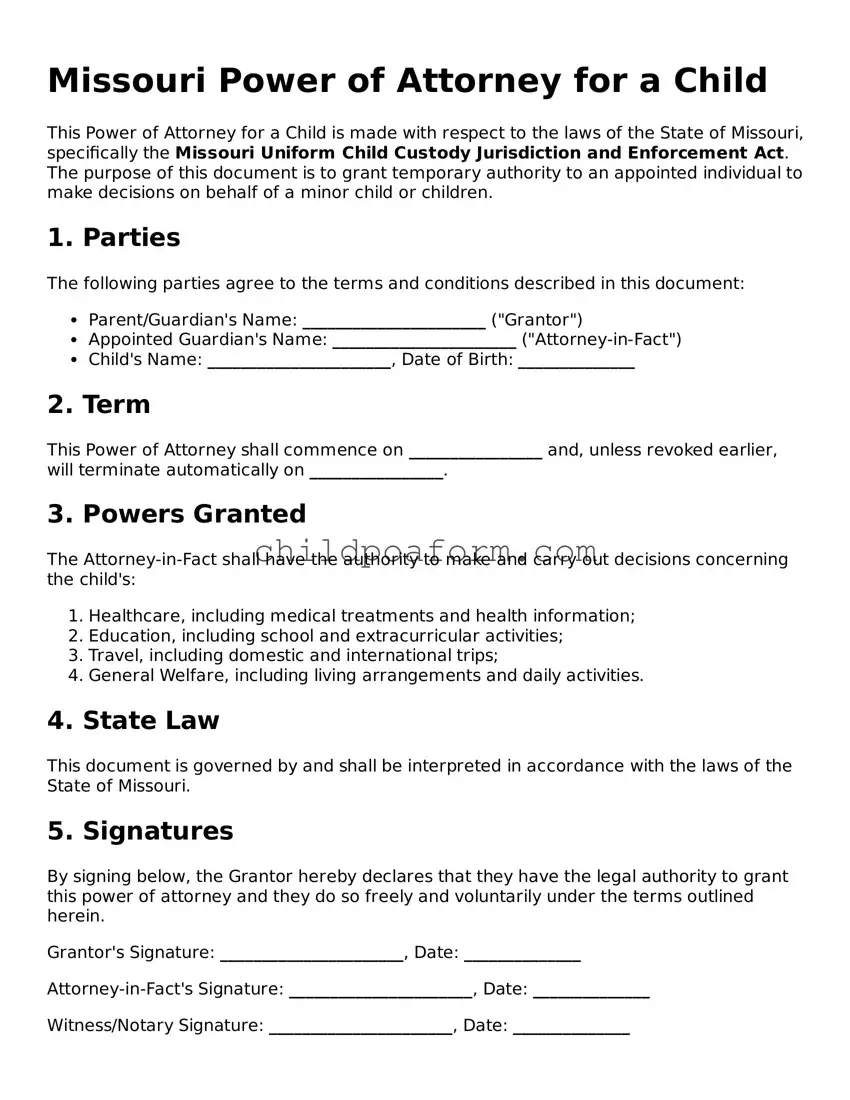Instructions on Utilizing Missouri Power of Attorney for a Child
Filling out a Power of Attorney (POA) for a child in Missouri is a critical process that allows a parent or guardian to legally designate another adult to make decisions and take care of their child for a certain period of time. This could be necessary for various reasons, including but not limited to, the parent's temporary absence, incapacity, or for military deployment reasons. Unlike a legal guardianship in court, a POA for a child is a less formal procedure and can usually be done without a lawyer. However, it's imperative that all information provided in the form is accurate and that the form is completed in accordance with Missouri law to ensure it's legally valid.
Step-by-Step Instructions for Filling Out the Missouri Power of Attorney for a Child Form:
- Obtain the form: First, get a copy of the Missouri POA for a child form. This can usually be found online through Missouri's official government websites or by contacting your local family court.
- Fill in the child’s information: Enter the full legal name, birthdate, and address of the child or children being covered by the POA form.
- Designate the agent: Identify the person you are giving the POA to, known as the agent. Include their full legal name, relationship to the child, and contact information. Ensure this individual is someone you trust deeply to make decisions concerning your child’s welfare.
- Granting of powers: Specify what legal powers you are transferring to the agent. This involves detailing what the agent can do on behalf of the child, such as making medical decisions, enrolling the child in school, or making travel arrangements. Be as clear and specific as possible to avoid any ambiguity.
- Term of the POA: Clearly state the time period for which the POA will be valid. Missouri law allows a POA for a child to last up to a maximum of one year, unless it is revoked sooner.
- Your information: As the parent or legal guardian, provide your full legal name, address, and contact information. If another parent or guardian is also granting this POA, their information must be included as well.
- Signatures: Sign the POA form in front of a notary public. The agent, and if applicable, the other parent or guardian, should also sign the form. Notarization is crucial as it authenticates the identities of those signing the document and validates the document.
- Notarization: Proceed to have the document officially notarized. Ensure the notary public fills in their section, stamps the form, and provides their signature to formally notarize the POA for a child.
- Distribute copies: Make copies of the notarized POA form. Provide the original to the designated agent, and keep a copy for your records. It's also advisable to give copies to any relevant institutions or individuals, such as schools or healthcare providers, where the agent will be acting on behalf of the child.
After completing these steps, the Power of Attorney for a child in Missouri will be in full effect. Remember, this legal document can be revoked at any time by the parent or guardian who granted it, as long as the revocation is done in writing. The POA form is a powerful tool in ensuring your child’s needs and interests are attended to by someone you trust, in your absence. Ensuring thoroughness in the form's completion is key to its effectiveness and ensures the agent can perform their duties without legal hurdles.
